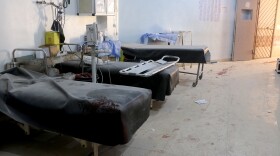
Ruth Sherlock
Ruth Sherlock is an International Correspondent with National Public Radio. She's based in Beirut and reports on Syria and other countries around the Middle East. She was previously the United States Editor for the Daily Telegraph, covering the 2016 US election. Before moving to the US in the spring of 2015, she was the Telegraph's Middle East correspondent.
Sherlock reported from almost every revolution and war of the Arab Spring. She lived in Libya for the duration of the conflict, reporting from opposition front lines. In late 2011 she travelled to Syria, going undercover in regime held areas to document the arrest and torture of antigovernment demonstrators. As the war began in earnest, she hired smugglers to cross into rebel held parts of Syria from Turkey and Lebanon. She also developed contacts on the regime side of the conflict, and was given rare access in government held areas.
Her Libya coverage won her the Young Journalist of the Year prize at British Press Awards. In 2014, she was shortlisted at the British Journalism Awards for her investigation into the Syrian regime's continued use of chemical weapons. She has twice been a finalist for the Gaby Rado Award with Amnesty International for reporting with a focus on human rights. With NPR, in 2020, her reporting for the Embedded podcast was shortlisted for the prestigious Livingston Award.
-
Libya's plans to hold national elections are in doubt as the country breaks down into regions controlled by local faction leaders — including the son of the former dictator.
-
Drought and extreme heat that scientists link to climate change are altering the UNESCO-protected marshlands. Iraq's average annual temperatures are increasing at nearly double the rate of Earth's.
-
Drought in Iraq means the country is only able to grow less than half its usual produce and is forcing mass migration from rural communities.
-
The current parties in power — many backed by militias involved in deadly attacks on protesters — are poised to dominate parliamentary elections scheduled to take place Sunday. Here's what to know.
-
The fall of a Syrian opposition town to the government this week after a siege and threats of air strikes serves as a reminder that the civil war continues.
-
Lebanon's former prime minister has given up on forming a new government, as the country's political and economic crises continue to worsen.
-
On Monday, flames swept through outbuildings of the al-Hussein Teaching Hospital in Nasiryah that had been set up to isolate COVID-19 patients.
-
Some nations that cut relations with the authoritarian regime of Bashar Assad are now hoping to influence Syria's future and contain their rivals. The U.S. says it still stands against normalization.
-
It was a decision that appalled and angered Syrian opposition groups and international medical organizations. On May 28 Syria was appointed to the World Health Organization's Executive Board.
-
After Syria announced the expected victory of President Bashar Assad in an election widely condemned as fake, three Syrians talk about the country's future.





